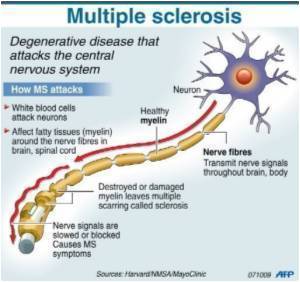Biologists have discovered a connection between multiple sclerosis (MS)-an autoimmune disorder that affects the brain and spinal cord-and gut bacteria.

Mazmanian and his colleagues tried to induce MS in animals that were completely devoid of the microbes that normally inhabit the digestive system.
"Lo and behold, these sterile animals did not get sick," he said.
They then inoculated mice with bacteria that had been shown to lead to intestinal inflammation.
The bacteria was also known to induce the appearance of a particular immune-system cell that causes an inflammatory cascade that leads to multiple sclerosis in animals.
Giving the formerly germ-free mice a dose of one species of segmented filamentous bacteria induced this cell not only in the gut but also in the central nervous system and brain-and caused the formerly healthy mice to become ill with MS-like symptoms.
Advertisement
The biologists insist, however, that the microbes aren't a direct cause of MS, but encourage conditions that could allow the disease to develop.
Advertisement
"Perhaps treatments for diseases such as multiple sclerosis may someday include probiotic bacteria that can restore normal immune function in the gut... and the brain," Mazmanian added.
The study appears online in the Proceedings of the National Academy of Sciences.
Source-ANI















